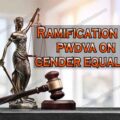
In a big relief for women suffering domestic violence, the Supreme Court has said that married women can claim the right of residence under the Domestic Violence Act even if the house is owned by in-laws.
Women who have been thrown out of their in-laws’ house due to a domestic dispute can now claim the right of residence in the “shared household” even if the house is owned by the in-laws.
In a judgment that would bring relief to many victims of domestic violence, a three-judge bench of the Supreme Court on Thursday held that “shared household”, under the protection of women from Domestic Violence Act 2005, can also be a house owned by the joint family or any relative of the husband, provided that the woman has lived in that house after her marriage as a long-term resident “in a domestic relationship”.
“In the event, the shared household belongs to any relative of the husband with whom in a domestic relationship the woman has lived, the conditions mentioned in Section 2(s) are satisfied and the said house will become a shared household,” held the bench of Justices Ashok Bhushan, R Subhash Reddy and MR Shah.
Victory for women’s rights
This judgment would come as a massive relief to women who have been thrown out of the matrimonial home and denied relief on grounds that the house is the sole property of their father-in-law or mother-in-law.
The bench, in its 150-page verdict, observed that “domestic violence in this country is rampant and several women encounter violence in some form or the other almost every day, however, it is the least reported form of cruel behaviour.”
The bench also observed that the Domestic Violence Act 2005 was a “step to secure social justice by legislation”
“The Act 2005 was enacted to give a higher right in favour of the woman. The Act 2005 has been enacted to provide for more effective protection of the rights of the woman who are victims of violence of any kind occurring within the family. The Act has to be interpreted in a manner to effectuate the very purpose and object of the Act,” said the court.





